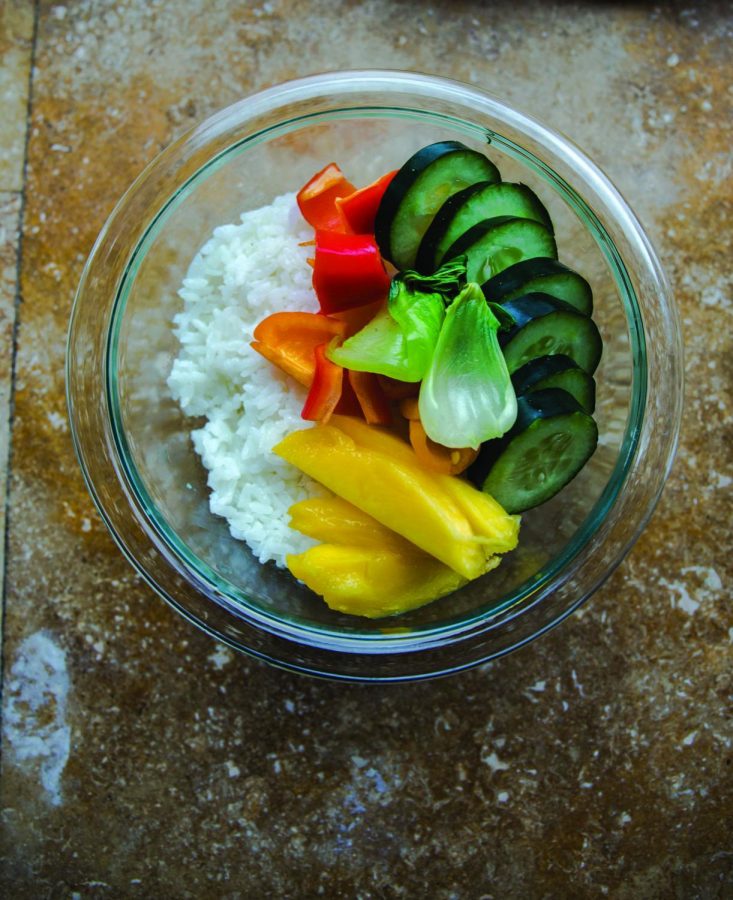Experts say plan meals, eat mindfully
February 18, 2019
Learning to plan meals may prove to be difficult for many Oregon State University students when on and off-campus, as they transition from having meals prepared at home.
There has been a popularization of college legends such as the “Freshman 15”, according to Mary Cluskey, nutrition associate professor in the College of Public Health and Human Sciences. However, she says techniques such as meal prepping and smart grocery shopping can lead to better eating habits.
Emma Wycoff, OSU second-year mechanical engineering major, found that she was able to find a stabilizing routine through planning healthy meals.
“Having a set plan for meals helps make my day a little easier. It’s one less thing to think about and it’s ready when I need it,” Wycoff said.
Erica Woekel, director of the Lifetime Fitness for Health Program, said beginner meal preppers should start slow. Planning a few simple meals and gradually increasing frequency and difficulty of the planned meals is the easiest way to start. Wycoff follows this mentality by planning dinner for each school day.
“I usually try to have at least dinners planned for each day during the school week. That’s always the hardest meal for me to cook or plan, so it’s easier to have it prepped and not have to do it the day of,” Wycoff said.
Woekel explained that having meals planned and ready to eat prevents mindless eating that many students fall into a habit of when they live on their own. According to Woekel, many students fall into habits of thoughtlessly eating through a whole bag of chips while studying or grabbing the most convenient food on the way to campus. To counteract these actions, Woekel suggests these students practice mindful eating habits such as meal prepping. By having
snacks or meals already prepared, students can avoid accidentally overeating or giving into cravings, Woekel said.
Deciding which foods to include in a meal prep is where many students may face challenges. Woekel believes that making healthy food choices boils down to focusing on food groups and making small improvements to foods you already eat. She suggests having a couple meal ideas including lean protein, whole grains, fruits and vegetables and being more aware of the nutritional value of meals.
Woekel stressed the importance of eating a diverse diet that includes all the necessary food groups and nutrients, despite what many current popular diets say. According to Cluskey, trendy diets often cycle through society, such as keto, organic, gluten free and many others. Cluskey said these restrictive eating schedules often popularize misconceptions of healthy foods.
Cluskey says she once encountered a participant in one of her studies who believed frozen vegetables weren’t a healthy food choice due to possible preservatives and chemicals included in the product which it clearly was not on the package label as the participant could see. However, as Cluskey said, frozen vegetables may actually be a smarter meal prep choice than fresh. Frozen vegetables are frozen in peak condition, so if they’re prepped in advance for meals and kept frozen they won’t lose nutrients during the waiting period.
“The thing with fresh is they’re already three to five days old when they get to the grocery store. By the time they get consumed or cooked, they’re actually less fresh and nutritious, in terms of having vitamins and minerals, than if they were in a frozen package. It’s all about handling.” Cluskey said.
Some other grocery shopping tips Woekel suggested are shopping the perimeter of the grocery store and being wary of displays. Along the perimeter of most grocery stores are the protein, grains, fruits and vegetables. According to Woekel, these food groups should be the main building blocks for meal prep. Wycoff follows these rules while grocery shopping and tries to cut out unhealthy snacks to prevent future snacking slip-ups.
“I try to mostly buy healthy and nutritious foods while I shop and avoid things that are empty calories. I might pick up an unhealthy snack or two while I’m at school, but I don’t like to keep them at home. I know that if I just don’t have it around, I won’t eat it and I won’t miss it,” Wycoff said.
Woekel recognized that cutting out every unhealthy food or snack isn’t viable, even meal preppers deserve the occasional guilty pleasure. Woekel suggested making small improvements to these foods, such as including additional vegetables and proteins in instant ramen, a college classic.
Grocery Store Tours, an OSU program through the Lifetime Fitness For Health course, offers a time for students to learn from mentors about how to pick foods that fit their dietary needs while grocery shopping. Brooklyn Reeves, a member of the program who trained the volunteers leading Grocery Store Tours, said that the tours are tailored to fit the needs of students living in the dorms or other living conditions that it aren’t convenient to shop or cook in often.















































































































